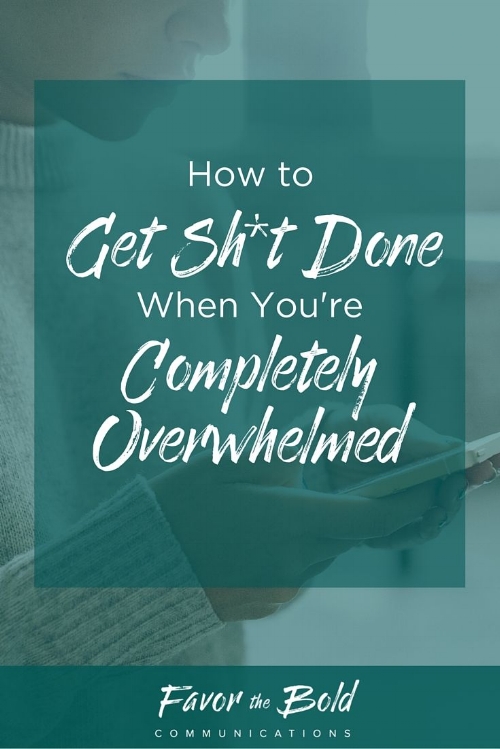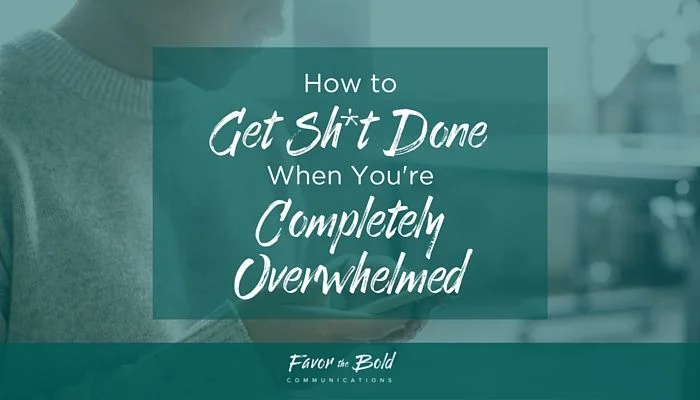If you run your own business, chances are, you're completely overwhelmed pretty much all the time. I know I am.
Because no matter much you get done, it seems like your to-do list just grows longer and longer. There are blog posts to write, emails to respond to, survey responses to analyze, social media posts to schedule, products to create.
Trying to stay on top of it all can take its toll: most days I'll finally look up from a client project or some content I'm creating to find that it's 3:00 pm, I haven't eaten, I'm still in my pajamas and my top knot has slid down my head into a weird side ponytail.
Since I wouldn't wish a side ponytail on my worst enemy, here are some tips for fighting overwhelm and getting sh-t done.
1. Organization, not overwhelm
Most overwhelm comes from feeling like you have SO much to do that you can’t do it all. When your to-do list is swirling around in your head, it can feel like everything you need to get done gets bigger and more urgent by the minute.
The solution? Get your to-do list out of your head and onto paper.
I’m a huge fan of the brain dump. On paper, NOT on your phone where you run the risk of getting even more distracted. Grab your journal or agenda or a piece of paper and write down every single thing you need to do.
I find it best to just do a rapid-fire unload: there’s no rhyme or reason, no organization. There are bullet points and exclamation points, flowcharts and diagrams. The key is just to get it all out.
Only when it’s all on paper does organization come in-- and even then, I use this term loosely. Once I can see my entire to-do list on paper, I can pretty easily prioritize what is urgent, what is important, and what can wait.
When your priorities are clear, you can focus on the most important tasks, without the distracting FOMO of feeling like you should be doing something else.
2. Action, not anxiety
Have you ever had one of those days where you feel super busy and stressed, but when you look back over your day, you don’t even know what you got done?
I'm awful about this. I get so caught up in feeling stressed about everything I have to do that I don’t actually do any of it. I’ll have a project to start that feels so big and overwhelming that I never start it. And then, like something out of a horror movie, the more I put off the project, the bigger and more overwhelming it becomes.
It’s a vicious cycle that only has one solution: action.
Just the simple act of starting-- something, anything-- helps you build the inertia you need to keep going.
Because that’s what it’s about: inertia. Not to get all Isaac Newton on you, but once you get in action, it’s a whole lot easier to stay in action.
It’s just physics.
So when you’re feeling overwhelmed and stressed out, look at the list you made (you did make your list, right?) and just start.
[Still struggling to get started? Check out this post for tips on how to stop procrastinating.]
3. Progress, not perfection
I struggle with this one every damn day and I know I’m not alone here. As creative entrepreneurs, we put our souls into our work, so of course everything we do should be perfect, right?
Wrong.
Sometimes (ok, most of the time) perfection isn’t about quality work, it’s about ego. At least it is for me. I want my work to be perfect because I want to be perfect. Which is obviously impossible (not to mention insane.)
And when we get like that-- when we obsess over formatting, or reread the same email seven times, or strain our eyes making sure our blog graphic is centered-- it keeps us from doing the real, important work that we’re meant to do.
I’m still figuring out how to get out of the perfection trap, but the best advice I can offer is this reminder:
Choose progress, not perfection.
The next time you’re stuck in that obsessive cycle of making sure it’s absolutely perfect, ask yourself: Does this actually need to be perfect? Or does it just need to be done?
Some things do need to be perfect. When I’m proofreading a document before it goes to print for a client, then yes, it needs to be perfect. But if I’m honest with myself, the majority of my work doesn’t require that level of flawlessness-- and I doubt much of yours does either.
So yes, it’s important that we care, deeply, about putting out quality work. But it’s worth the reminder: just because it’s not perfect, doesn’t mean it’s not good enough.
Because hiding behind detail-oriented perfection can be an excuse not to do the real, important work. It's a cop-out. It does a disservice not only to you, but also to those you’re trying to help. The longer you wait for perfection, the longer they wait for your solution to their problem.
And they don’t need that solution to be perfect. They just need it to be done.









